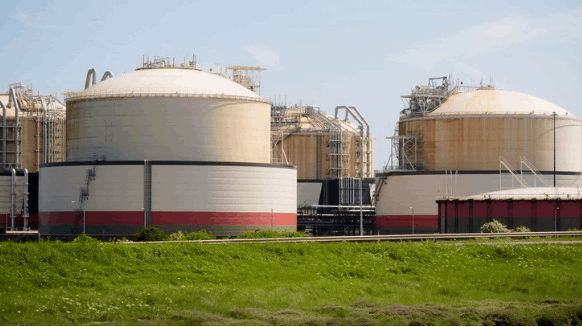LNG 'Chain Reaction' Taking Place in Europe

Total liquefied natural gas (LNG) deliveries to Europe will likely approach 11 million metric tons (MMt) for March, according to the most recent assessment from the IHS Markit LNG Research Service.
In a written statement emailed to Rigzone late last week, IHS Markit noted the projected 11-MMt in deliveries would be an all-time high. In fact, the information services firm pointed out the volume of LNG flowing into Europe surpasses the previous record in Dec. 2019 by 14 percent – and at a time when gas demand is plunging at double-digit rates.
“The record in LNG deliveries to Europe is a domino effect from the demand impacts of the coronavirus pandemic,” remarked Michael Stoppard, IHS Markit’s chief strategist for global gas. “Asian buyers are reselling volumes purchased from the U.S. and portfolio sellers are offloading their excess cargoes as well. This already comes as European gas markets are already in extreme distress.”
IHS Markit stated the record influx of LNG deliveries should cause gas storage in the European Union – already higher than historic averages – to swell and prices. Moreover, the firm predicted that prices – already at historical lows – will undergo additional downward pressure.
In addition, IHS Markit pointed out that Europe stands to achieve another LNG milestone. For the first time ever, the region will in March import nearly as much or more LNG than South Korea and Japan combined. Other observations from IHS Markit include:
- The United Kingdom and France will likely each import approximately 2 MMt of LNG in March while the volumes of U.S.-sourced LNG that Asian buyers re-sell into Belgium could total more than 1 MMt.
- Eastern Mediterranean buyers that had acquired large LNG volumes on the spot market during the winter appear to be slowing down their imports.
- Europe will start April with record conventional storage levels and short-term demand should fall “substantially” in the coming weeks as a result of the COVID-19 pandemic.
- As of March 25, underground storage facilities in the EU and U.K. were 55 percent full – 21 points higher than the five-year historical average. LNG inventories in Northwest Europe were also just above 50 percent, with no signs of send-out rates into the region decreasing. The situation is also pressuring pipeline supplies, with Russian pipeline flows for February down 16 percent year-on-year.
- The additional LNG deliveries into Europe have prompted the start of net storage injections and reduced pipeline supply compared to this time in 2019. Thanks to the early storage fill, third-quarter and winter deliver prices face additional pressure.
“This unprecedented surge of LNG supply to Europe is certain to cause knock-on effects,” concluded Shankari Srinivasan, IHS Markit’s vice president for gas and power. “Storage inventories will build up earlier than normal and that will put additional downward pressure on prices in the third quarter and winter delivery months. It is a chain reaction.”
To contact the author, email mveazey@rigzone.com.
WHAT DO YOU THINK?
Generated by readers, the comments included herein do not reflect the views and opinions of Rigzone. All comments are subject to editorial review. Off-topic, inappropriate or insulting comments will be removed.
- How Likely Is an All-Out War in the Middle East Involving the USA?
- Rooftop Solar Now 4th Largest Source of Electricity in Australia
- US Confirms Reimposition of Oil Sanctions against Venezuela
- EU, Industry Players Ink Charter to Meet Solar Energy Targets
- Analyst Says USA Influence on Middle East Seems to be Fading
- Russian Ships to Remain Banned from US Ports
- Brazil Court Reinstates Petrobras Chair to Divided Board
- EIB Lends $425.7 Million for Thuringia's Grid Upgrades
- Var Energi Confirms Oil Discovery in Ringhorne
- Seatrium, Shell Strengthen Floating Production Systems Collaboration
- An Already Bad Situation in the Red Sea Just Got Worse
- What's Next for Oil? Analysts Weigh In After Iran's Attack
- USA Regional Banks Dramatically Step Up Loans to Oil and Gas
- EIA Raises WTI Oil Price Forecasts
- How Likely Is an All-Out War in the Middle East Involving the USA?
- Venezuela Authorities Arrest Two Senior Energy Officials
- Namibia Expects FID on Potential Major Oil Discovery by Yearend
- Oil Markets Were Already Positioned for Iran Attack
- Is The Iran Nuclear Deal Revival Project Dead?
- Petrobras Chairman Suspended
- Oil and Gas Executives Predict WTI Oil Price
- An Already Bad Situation in the Red Sea Just Got Worse
- New China Climate Chief Says Fossil Fuels Must Keep a Role
- Oil and Gas Execs Reveal Where They See Henry Hub Price Heading
- Equinor Makes Discovery in North Sea
- Macquarie Strategists Warn of Large Oil Price Correction
- DOI Announces Proposal for Second GOM Offshore Wind Auction
- Standard Chartered Reiterates $94 Brent Call
- Chevron, Hess Confident Embattled Merger Will Close Mid-2024
- Analysts Flag 'Remarkable Feature' of 2024 Oil Price Rally


